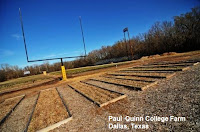 Last month, Ranch Foods Direct received an official USDA grant of inspection authorizing on-farm use of a mobile meat processing unit now parked at Callicrate Cattle Co. Considering that the entire processing of each animal will be carefully observed by a USDA meat inspector — who isn't busy trying to watch hundreds of animals coming off of a processing line literally every minute as he or she would in a large plant — you might think the authorization process was a breeze. It wasn't. It took nearly a year after the prototype was completed to obtain the certification while planners doggedly wrote and rewrote an extensive HACCP food safety plan. Fortunately, a nonprofit group called the Nebraska Environmental Action Coalition took the lead, committing untold resources and vigorously pushing the mobile processing concept in an attempt to benefit rural economies and increase small scale processing options. Their assistance made it possible for Callicrate Cattle Co. to host one of the first affordable working trailers in the nation.
Last month, Ranch Foods Direct received an official USDA grant of inspection authorizing on-farm use of a mobile meat processing unit now parked at Callicrate Cattle Co. Considering that the entire processing of each animal will be carefully observed by a USDA meat inspector — who isn't busy trying to watch hundreds of animals coming off of a processing line literally every minute as he or she would in a large plant — you might think the authorization process was a breeze. It wasn't. It took nearly a year after the prototype was completed to obtain the certification while planners doggedly wrote and rewrote an extensive HACCP food safety plan. Fortunately, a nonprofit group called the Nebraska Environmental Action Coalition took the lead, committing untold resources and vigorously pushing the mobile processing concept in an attempt to benefit rural economies and increase small scale processing options. Their assistance made it possible for Callicrate Cattle Co. to host one of the first affordable working trailers in the nation.I thought of all this at lunch this weekend, after someone alerted me to a news story about an unusual taco stand in California that is no longer able to sell a traditional Mexican specialty item, due to a clamp-down by the food police. The main ingredient in the grasshopper tacos —imported Oaxacan grasshoppers — were not "FDA approved." But officials agree there are no FDA approved sources for making this surprisingly popular dish. (Same story on the cicadas that made it into a top-selling batch of ice cream in Missouri.) There's also no indication anyone was ever sickened by either product.
Meanwhile, in Europe, one of the most dangerous e-coli outbreaks in history was attributed to officially certified organic bean sprouts.
It's obvious that regulatory hurdles are a threat to food entrepreneurship while falling short of insuring all approved foods are truly safe. A "cottage foods" designation is one form of protest, as is the push for "food sovereignty" occurring in a few communities willing to bet their economic futures on the production of healthy, local foods. Most observers would likely agree that the food police have somehow managed to go too far at the same time they have not gone far enough in the ways that really count.

